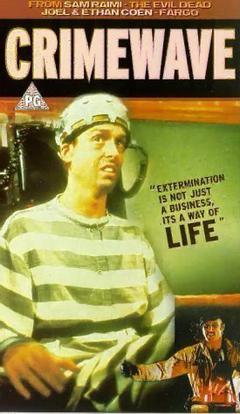 Next on my little list of Coen Brothers movies is 1985’s Crimewave for which they wrote the script with Sam Raimi, who directed the piece. Though the Coens didn’t have as much control over this project, their influence in its construction is palpable and one can definitely feel their ability to maneuver - as I like to say it - “kitchen-sink” crimes. Each scene is almost like a mini-movie, with a beginning, a middle, and an end - all pertinent to the overarching power of the film. There is such a wealth of delectable images, crystal-clear characters, plot mechanisms, and layered crime scenarios, that it is almost too much to bear at times, but they manage to pull it off because every aspect of the film is completely caricaturized. It seems like this was the perfect follow up after Blood Simple, in which the Coens told us they can make a great crime, drama, thriller all in one, but, in Crimewave, they tell us that they can cook up a dish with all the latter ingredients alongside a course of film noir/black comedy.
Next on my little list of Coen Brothers movies is 1985’s Crimewave for which they wrote the script with Sam Raimi, who directed the piece. Though the Coens didn’t have as much control over this project, their influence in its construction is palpable and one can definitely feel their ability to maneuver - as I like to say it - “kitchen-sink” crimes. Each scene is almost like a mini-movie, with a beginning, a middle, and an end - all pertinent to the overarching power of the film. There is such a wealth of delectable images, crystal-clear characters, plot mechanisms, and layered crime scenarios, that it is almost too much to bear at times, but they manage to pull it off because every aspect of the film is completely caricaturized. It seems like this was the perfect follow up after Blood Simple, in which the Coens told us they can make a great crime, drama, thriller all in one, but, in Crimewave, they tell us that they can cook up a dish with all the latter ingredients alongside a course of film noir/black comedy.
As Blood Simple ends with an “unsolved” mystery to the eyes of any crime detective, Crimewave begins with an “unsolved” mystery to the eyes of any crime detective. Or, in this case, the eyes of penitentiary executioners, because the first shot of the movie opens with Victor Ajax, played by Reed Birney, sitting in an electric chair for allegedly murdering people that were, in fact, killed by psychotic exterminators. I don’t wanna give away the ending, but I can assure you that, if anything, this piece showed an unexpected range from the Coen Brothers when it was released. With only two major movies under their belt at the point, audiences saw that the duo could make an intricate crime story comedic, or heart-wrenchingly visceral. It didn’t do too well at the box office, but it was a great experience for both the Coen Brothers and Raimi - I mean, I don’t really know if it was a “great” experience, but one can hypothesize as such because I’ve noticed several elements of Crimewave in all of their later work. So, even if making the film was not a “great experience,” it is certain that its creation remains heavily significant in regard to subsequent Coen Brothers’ and Raimi films.
I’ll leave you with one final note about the movie: The decision to create, in a sense, a caricature of a crime is what makes this film, giving Raimi and the Coens license to make anything as ridiculous as they wanna make it. It can be a little overbearing at times, but I only think it’s because the Coens didn’t direct it.
No comments:
Post a Comment